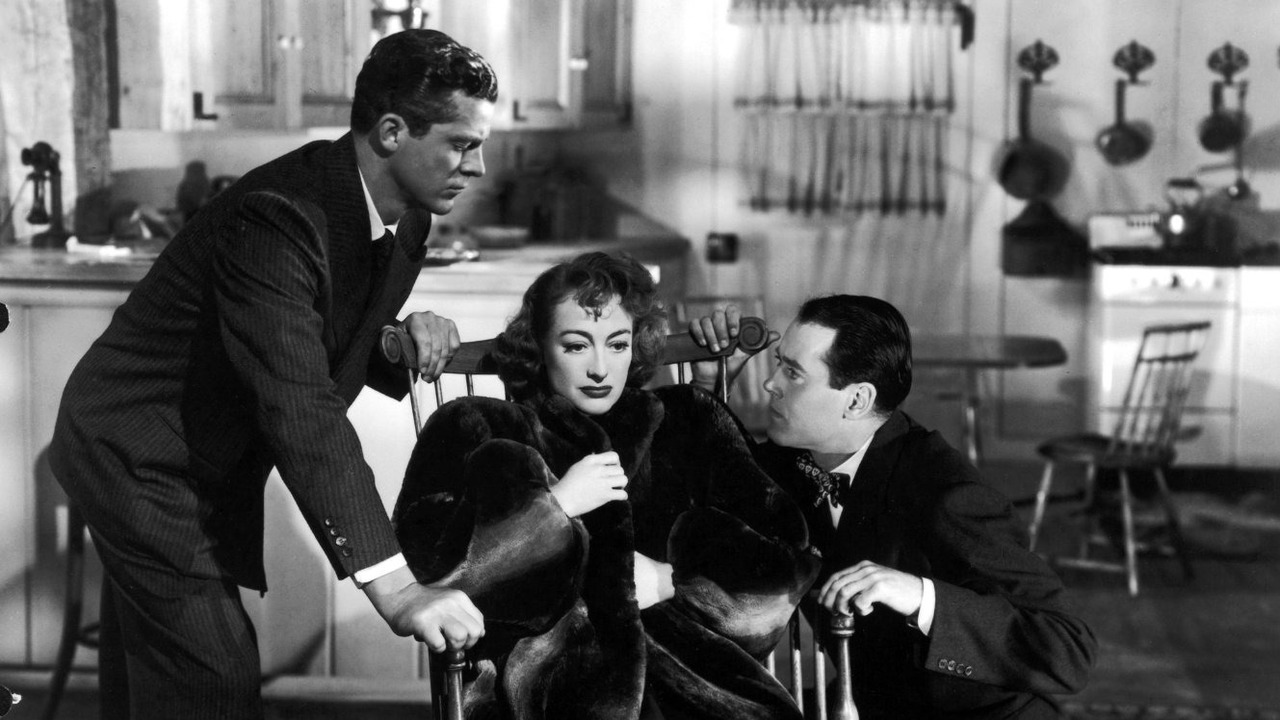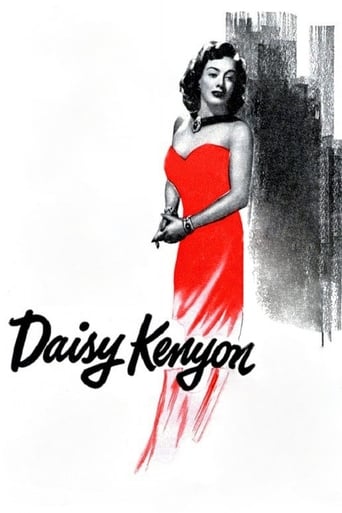



Very Cool!!!
This Movie Can Only Be Described With One Word.
Masterful Movie
I am only giving this movie a 1 for the great cast, though I can't imagine what any of them were thinking. This movie was horrible
View MoreA woman becomes romantically involved with a married man and an army veteran. Given the talents of the star trio and the director, this one is a disappointment. This seems to be an attempt at another "Mildred Pierce," but falls far short. The main problem is the screenplay, which is little more than a soap opera. Crawford has to choose between rich but married Andrews and decent but dull Fonda. There is no exposition, with Crawford and Andrews having a tiff in the opening scene even before we get to know the characters. The dialog is mostly pedestrian. The goings on are mostly mundane until the latter stages, when it starts to become somewhat interesting. There's not much here beyond star gazing.
View MoreA well off and capable New York corporate lawyer (Dana Andrews) carries on an ongoing affair with a successful fashion designer (Joan Crawford) who waits for him to divorce his wife (Ruth Warrick). This he finds difficult to do because of the two daughters and his position with his father-in-law whose law firm he works for. There are some complex issues in this situation with the wife, kids, work, and Joan Crawford in a fairly tender part as Daisy. The dialogue between the characters shows a sophistication as they deal with the situation that is fairly impressive. When Henry Fonda shows up as a widowed WW2 vet, there are several scenes between him and Andrews or with him, Andrews, and Crawford that move right along with interesting observations, as both men love the same woman, and the woman, who loves them both, seems to want to keep her own identity as well. The divorce court scenes come in towards the end to make the film a court drama as well, but do not intrude as the issues with Crawford's character become exposed by the lawyer representing the Andrew's wife. Though the film is not a crime drama, a lot of the B&W photography by Leon Shamroy looks like ace film noir. Some may say that director Otto Preminger would not voluntarily take on a project like this, that it must have been contractually foisted upon him. If so, he did a fairly admirable job, keeping the characters from going over the top while keeping up the pace and making a pretty tough ending with a surprisingly tender Dana Andrews, whose definitely at or near his best.
View MoreThe Preminger Paradox has often been noted: Otto was a notorious tyrant on the set, but his films are like courtrooms in a good way. Everyone gets a fair hearing. The keynote of Preminger's movies is moral ambiguity; they never turn on a simple axis of good and evil, and they feature few characters who are entirely sympathetic or unsympathetic. And despite his legendary tantrums, he consistently drew subtle, tamped-down performances from the actors he terrorized. DAISY KENYON displays all of these virtues and uses them to complicate what would otherwise be a conventional love-triangle plot. The film is impressive in its nuance, complexity and ambivalence. It's not completely satisfying, but perhaps that's the point. By the end, you realize that no possible outcome to the story can really be a happy ending.It's trite but tempting to say that this is a Joan Crawford movie for people who don't like Joan Crawford. Despite her central, eponymous role, Crawford as Daisy is never as interesting as the two men in her life, Dan O'Mara (Dana Andrews) and Peter Lapham (Henry Fonda). Neither Andrews nor Fonda wanted to do the movie, presumably feeling that they would be playing second fiddles to the female star, but they outshine her. Crawford wanted desperately to do the movie, and it's easy to see why: at 40-something she gets to play an attractive young career-woman being fought over by two very attractive men. (Some predicament! I guess that's why they call this a "woman's picture.") However, girlish dresses with lace collars don't make Crawford look any younger, and the shadowy lighting allegedly designed to hide her wrinkles only adds to the inappropriate sense that she might be about to reach for a carving knife. Crawford is great in MILDRED PIERCE, SUDDEN FEAR and POSSESSED, all made around the same time. Here she's not only too old but too strong and too alarmingly intense for a character who should be softer and more likable.Daisy is a successful commercial artist involved with a married man. She loves him but knows it's a dead-end relationship, so she agrees to marry another man whom she doesn't love, but who needs her badly. This is pretty standard stuff, but in detail it's oddly persuasive. Dan O'Mara is a glib, high-powered lawyer, spoiled and overconfident, a man who cheats on his wife and treats her with cold contempt. He's a heeland yet Dana Andrews makes him not only sexy but somehow sympathetic. (This was the third of four films Andrews made with Preminger, a quartet that gave him his best roles and made brilliant use of his gift for ambivalence.) Everything comes too easily for Dan; he knows he's smarter than the people around him, and his charm is irresistible, despite his slick habit of calling everyone "honeybunch" and "dewdrop." His daughters adore him, his secretaries adore him, maitre-d's adore him. Then everything goes wrong: he loses the first case he ever really cared about (defending a Japanese veteran dispossessed of his land), he loses his daughters to divorce, and then he loses his mistress. The bleakness that comes out in his face feels like it was there all along, under the smirk. Dana Andrews had the most haunted eyes in Hollywood. Here they're haunted by self-knowledge.Peter Lapham is a lonely, psychologically wounded veteran and widower. He's gentle and low-key; his vocation as a yacht-designer hints at something graceful and fine in him. But there's something creepy about him too; he declares his love for Daisy on their first date, then forgets to call her, then sets up surveillance and follows her home. "The world's dead and everyone in it is dead except you," he tells her unnervingly. Peter is obviously the more deserving man, but his method of pursuing Daisy is sneakily passive-aggressive, and they are never as convincing a couple as Daisy and Dan. You can't tell up to the last minute which man she will end up with, or even which one you want her to end up with, which is the film's triumph.DAISY KENYON has been released on DVD as part of Fox's Film Noir series, which is misleading, but there is something hard to place about the film. The look is typical forties high-gloss (Daisy lives in a ridiculously palatial "Greenwich Village" apartment, which her lover refers to as a "hovel," on an eerily deserted studio street), but the shadows are as dark as any noir. And there is an undercurrent of unpleasantness throughout the filmnightmares, child abuse, racism, adultery. This too is typical of Preminger, who did more than anyone to force Hollywood to grow up and face the facts of life. The shadows aren't only in the cinematography; they don't just fall across the characters but spread from inside them.
View MoreI've seen about a dozen Preminger films and this is my favorite. I wasn't expecting too much once the movie began because it seemed I had seen this all done before but Preminger's characters (as is usually the case) are much more realistic than typical Hollywood movies of this era. The characterization actually compares favorably to foreign films of the time, like for example Quai des Orfèvres from the same year; this movie could easily have been a French production. I'm not much a fan of Crawford or Fonda but this is probably the best I've seen Fonda; and Crawford was just fine. Dana Andrews is superb - probably his best movie! What made this movie for me was that I could relate to all three main characters - in many ways they are more ideas (or philosophies) than actual people but the odd thing is that the line was so blurred that even though I knew this was the case I still enjoyed them as people. What puts this above the other Premingers I've seen is the very tight script, the fast pacing, and three fully realized characters that came across not only as real but as themes in themselves. Add in a memorable supporting cast and everything just blends together to make a perfect concoction.
View More